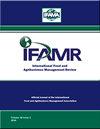2019冠状病毒病大流行期间缺粮国的农产品贸易韧性
IF 1.5
4区 经济学
Q3 AGRICULTURAL ECONOMICS & POLICY
International Food and Agribusiness Management Review
Pub Date : 2023-03-17
DOI:10.22434/ifamr2022.0093
引用次数: 0
摘要
本文研究了2019冠状病毒病大流行期间低收入和缺粮国(LIFDCs)的贸易抵御力。自宣布大流行以来,低收入发展中国家由于严重依赖粮食进口,面临着独特的挑战。本文利用动态处理效应模型和月度产品级农产品贸易数据,确定了COVID-19封锁对低收入发展中国家农产品出口的差异贸易影响。基线结果显示,在疫情宣布后的头三个月,对低收入发展中国家的农产品出口急剧下降,之后逐渐恢复。在产品和国家两级的进一步分析表明,低收入发展中国家侧重于从国外获取谷物产品,而其他农业食品的进口相对于反事实大幅减少。在治疗后的第一季度,低收入发展中国家的国外供应链的弹性不如其他低收入国家,但它们的恢复速度也快于其他低收入国家。本文为国际组织对农业食品供应链弹性和COVID-19遏制措施提出的担忧提供了实证依据,揭示了封锁对发展中国家农业食品贸易弹性的不同影响。本文章由计算机程序翻译,如有差异,请以英文原文为准。
Agri-food trade resilience among food-deficit countries during the COVID-19 pandemic
This paper examines the trade resilience of low-income and food-deficit countries (LIFDCs) during the COVID-19 pandemic. Since the pandemic declaration, LIFDCs have faced unique challenges due to their heavy reliance on food imports. This paper identifies the differential trade effects of COVID-19 lockdowns on agri-food exports to LIFDCs using a dynamic treatment effects model and monthly product-level agri-food trade data. The baseline results show a sharp decrease in agri-food exports to LIFDCs in the first three months after the pandemic declaration and a gradual recovery afterward. Additional analyses at the product and country levels show that LIFDCs focused on securing cereal products from foreign sources and that imports of other agri-food products contracted considerably relative to the counterfactual. The foreign supply chains of LIFDCs were less resilient in the first quarter after the treatment than those of other low-income countries, but their recovery was also faster than in those other countries. The paper provides the empirical underpinning for concerns raised by international organizations regarding the resilience of agri-food supply chains and COVID-19 containment measures, revealing the differential impact that lockdowns had on agri-food trade resilience in the developing world.
求助全文
通过发布文献求助,成功后即可免费获取论文全文。
去求助
来源期刊

International Food and Agribusiness Management Review
AGRICULTURAL ECONOMICS & POLICY-
CiteScore
2.90
自引率
0.00%
发文量
0
审稿时长
>12 weeks
期刊介绍:
The IFAMR is an internationally recognized catalyst for discussion and inquiry on issues related to the global food and agribusiness system. The journal provides an intellectual meeting place for industry executives, managers, scholars and practitioners interested in the effective management of agribusiness firms and organizations.
IFAMR publishes high quality, peer reviewed, scholarly articles on topics related to the practice of management in the food and agribusiness industry. The Journal provides managers, researchers and teachers a forum where they can publish and acquire research results, new ideas, applications of new knowledge, and discussions of issues important to the worldwide food and agribusiness system. The Review is published electronically on this website.
The core values of the Review are as follows: excellent academic contributions; fast, thorough, and detailed peer reviews; building human capital through the development of good writing skills in scholars and students; broad international representation among authors, editors, and reviewers; a showcase for IFAMA’s unique industry-scholar relationship, and a facilitator of international debate, networking, and research in agribusiness.
The Review welcomes scholarly articles on business, public policy, law and education pertaining to the global food system. Articles may be applied or theoretical, but must relevant to managers or management scholars studies, industry interviews, and book reviews are also welcome.
 求助内容:
求助内容: 应助结果提醒方式:
应助结果提醒方式:


